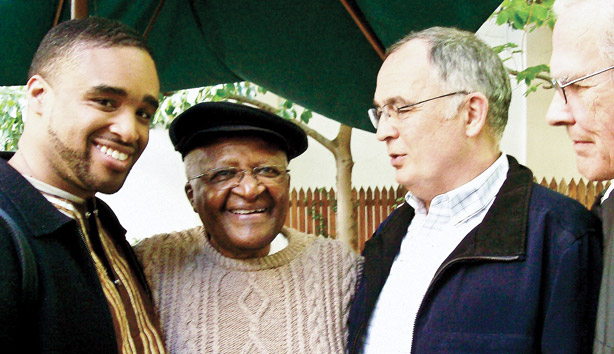Voices From the SPU Community
Educating the Children of South Africa's Townships
By Tali Hairston

From left: Tali Hairston and Desmond Tutu
Five years ago, on my first visit to the township of Tembisa, South Africa, I stood in a classroom overflowing with neatly dressed yet impoverished black African children. While our children in the U.S. play with computers in heated buildings, learn from multiple educators, and chow down on breakfast, lunch, and snacks, many township kids live minutes from great wealth yet are educated in abject poverty. Teachers are paid very little, and nearly all live within the townships themselves.
This is the lingering impact of racism. Apartheid is over, and South Africa has come so far, yet many challenges lie ahead. South Africa reminds us that reconciliation is not a destiny to be reached, but a journey that requires faithfulness.
There was no doubt in my mind that Seattle Pacific University's John Perkins Center could and should support this classroom of wonderful children. Children are the most vulnerable in any society, but particularly in communities where historic trauma and conflict linger. Our desire was to join other organizations in helping local leaders build a model school for townships throughout South Africa.
Now, five years later, the classroom of kids has expanded from a daycare to South Africa Child Academy, a quality township school. I returned to Tembisa in April 2010 with leaders from Mercer Island Presbyterian Church to hear the concerns and hopes of the school board, teachers, and students in an effort to understand their felt needs. My role was to research those needs and begin facilitating the long-term plan for meeting those needs, using my background in Christian community development.
Our team also hoped to meet with Bishop Desmond Tutu in Cape Town in order to discuss his support of township education. We visited St. George Parish, where Tutu officiated the morning service, and later sat down for tea with him, his colleagues, and friends from around the world.
Tutu's unassuming way was surprising to me, but should not have been. Like John Perkins, Tutu embodies reconciliation in the way he looked at us as if we were not strangers, the way he listened to us as if this would not be our last conversation. For him, reconciliation is less an idea or project than a way of being in relationship with others. We shared our vision for educating the children of South Africa's townships and were encouraged by his advice and blessing.
The Perkins Center is designed to engage communities such as Tembisa, connecting students, staff, and faculty to the work of reconciliation and community development beyond campus. Next year, a group from SPU will visit the South Africa Child Academy in Tembisa, further strengthening the University's ties with the school and our commitment to global education.
For Seattle Pacific, for the Perkins Center, and for South Africa, God continues to paint a picture of just how world change happens.

Tali Hairston is director of the John M. Perkins Center for Reconciliation, Leadership Training, and Community Development, and special assistant to the president at Seattle Pacific University.
